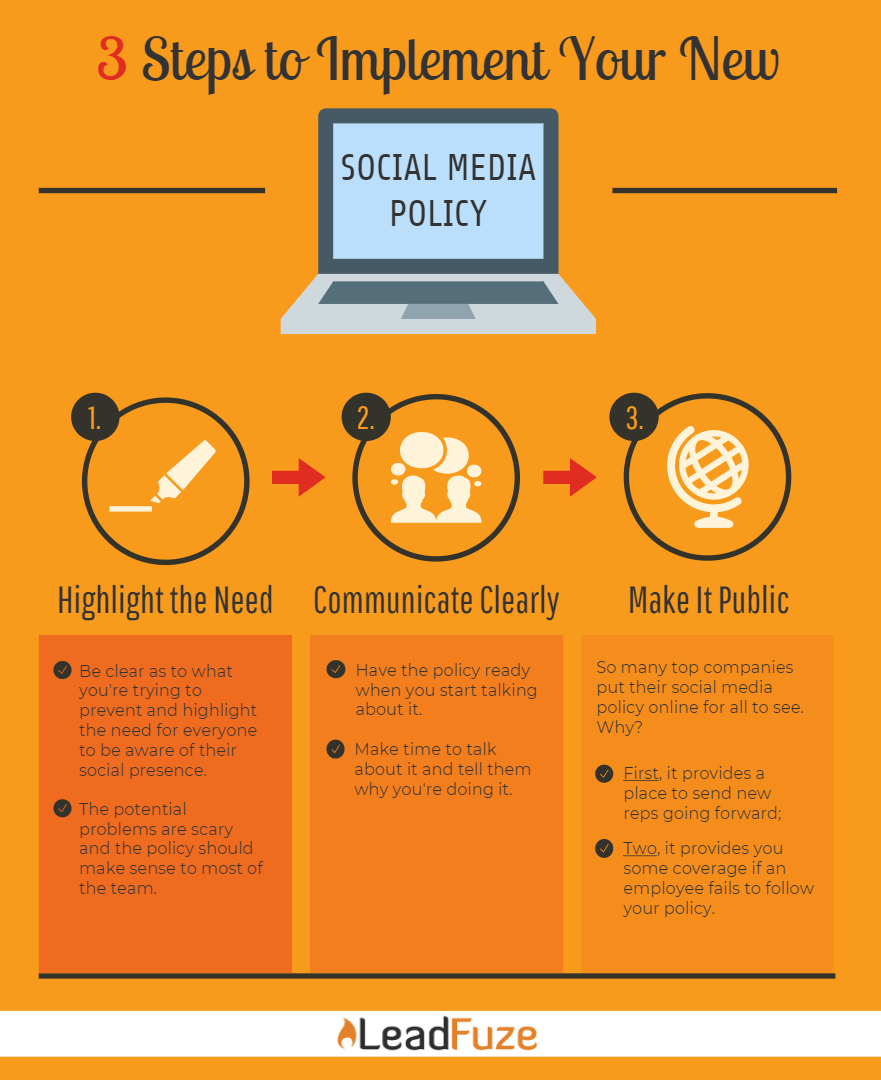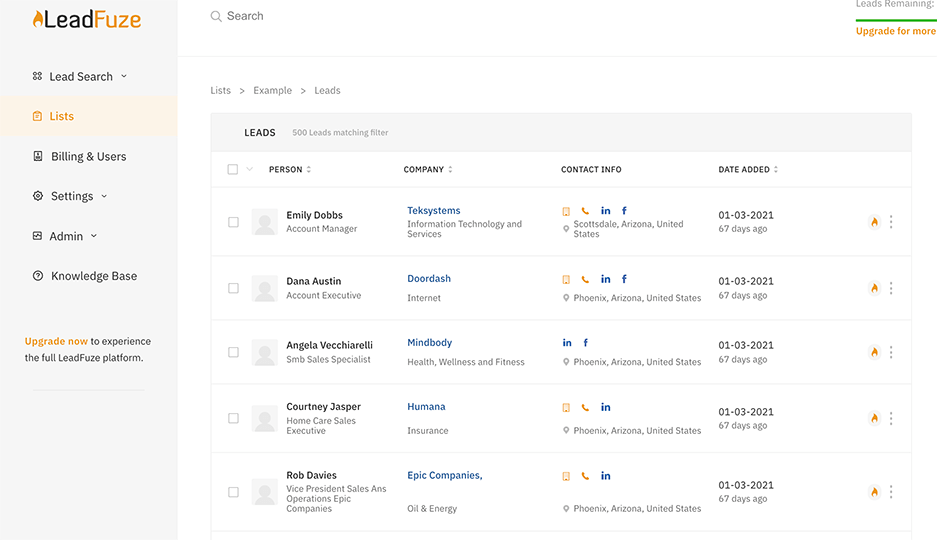What is a Social Media Policy?
A social media policy is a document that specifies how an individual or organization can use social media. It often includes guidelines about what not to post and who has permission to do so, as well as any repercussions for violating the policy.
Importance of a Social Media Policy
Imagine you (or one of your reps) tweet something on your company profile without really thinking about it. Then go home for the day.
Turns out you (or your rep) misunderstood a hashtag. Instead of it being sales-related, it was actually supposed to raise awareness for some big cause. Now, the brand (by association) is coming off as insensitive and exploitive. They may say “all publicity is good publicity”, but it’s not as true as it once was. If it ever was at all.
Social media is crazy powerful, but it's more fickle than anyone could have imagined. Share on XBusinesses, their employees, and others mess things up constantly. Social media is crazy powerful, but it’s more fickle than anyone could have imagined.
Don’t believe me?
Here’s what just happened to Snapchat.
Kylie Jenner tweeted (image below) about Snapchat negatively, and it cost the company over a billion dollars.

You probably don’t have a sales rep or employee with quite that much pull, but there are plenty of scenarios that can occur when employees are representing you. Here are a few more “realistic” things that have happened.
- Over Engagement: This one is common. Your reps are just bugging leads too much. Sending private “how ya doing” messages on LinkedIn, creepily liking everything they post, or even making public comments about them — all bad and some are just creepy.
- Over Aggressive: Much like over engagement, but these reps take the “always be closing” mantra to a whole other level. Using social media to sell is very powerful. And much like other powerful tools, it has to be used correctly. You don’t want to scare prospects away.
- Over Sharers: There are very few secrets today, but that doesn’t mean we don’t try. Sensitive company information can find itself in the hands of reps, who can then let it fly onto the social airwaves. New features, investment details, even current clients who would like to remain unknown.
Seeing the need for a social media policy yet?
Again, there are a number of things that can go wrong that range from national headline problems to losing a few leads.
4 Benefits of a Social Media Policy
Social media policies can bring many benefits to organizations. Here are just a few:
- Protecting your organization from lawsuits and defamation suits
- Avoiding the embarrassment of being called out publicly for something you posted on social media that harmed or offended someone, whether it was intentional or not
- Establish clear guidelines so employees know what’s allowed and what isn’t
- The right social media policy can ensure that the organization maintains its reputation.
7 Social Media Policy Examples: What Should Go in Yours?
When it comes to this and most other policies, common sense goes a long way. This sort of guideline is a common-sense way of protecting yourself (or your organization) from those who lack, well, common sense.
That said, I’ve reviewed several companies and their social media policies. Here are the elements I found in most of them.
1 Disclaimer
There is always a section (usually at the very top) clearly stating that all employee-created content is their own. Even if the company is mentioned, they had no part in creating or publishing what was written or said. Take the example below from IBM’s social media policy.
“IBMers are personally responsible for the content they publish online, whether in a blog, social computing site or any other form of user-generated media.”
2 How to use social
If your reps use social media, there should be a list of acceptable methods and practices. In sales, there are a number of stages of the sales funnel. Even after a customer has bought something, reps can reach out to maintain relationships.
The Washington Post has a similar predicament. Their reporters can reach out via social for a number of reasons. Due to this, they’ve constructed their policy to highlight each broad category. These categories include communicating news, using social media for reporting purposes, and personal reasons.
For sales, you may have caveats for initially reaching out, following up with leads, and post-sale communication (for example).
3 The decent person clause
All of the policies have the basic human tenets of being a decent person. This one could be easy. Your company may have an ethics policy highlighting how to treat customers and co-workers. Including mention of these existing policies would be a good idea.
4 Keep secrets a secret
No brainer, right?
But, it still needs to go into your policy. Features in development, client details, or any other secret are bound to get out. If you have a clause, it would be way easier to clean up than if you’d just let it happen without protecting yourself.
5 Require a course
This one isn’t for the faint of heart. People usually don’t like change enough (more on that in a second). However, it may not be a bad idea to make your reps take a course showing how social media works (or just take it yourself).

Coca-Cola actually has a certification course of its own for all official spokespersons that are referenced in their policy.
Resource: Hootsuite has a fantastic (and free) social media marketing course that covers how to use popular platforms and fundamental best practices.

6 A warning
Most of the policies I looked at had a very sobering warning (typically toward the end). It was always something to the effect of, “The internet is a permanent and unforgiving place,” The key takeaway is that once you say something, someone probably has a record of it and will use it against you if possible.
7 Encourage social activity
You want your reps to say where they work and to talk about it. I put LeadFuze right in my LinkedIn profile proudly. You probably do the same. Every policy I’ve read encourages social content, and it’s necessary. Even the word “policy” has a stuffy feeling.
If you don’t let people know you want them to be social, they could avoid violating rules by being less active on social media.

3 Steps in Implementing New Social Media Policy
Almost everybody hates change. Sales reps included. New tactics that help close more deals, sure. New policies that tell them what they can and can’t do — not so much.
Here are 3 quick steps to help you avoid the most headaches.
Step #1: Highlight the need
Be clear as to what you’re trying to prevent, and highlight the need for everyone to be aware of their social presence. The potential problems are scary, and the policy should make sense to most of the team. If you recently had an incident, you’ll have the context to go along with this one.
Step #2: Communicate clearly
Have the policy ready when you start talking about it. Don’t just throw it in front of them, but make time to talk about it where you tell them why you’re doing it (e.g. step one).
Step #3: Make it public
So many top companies put their social media policy online for all to see. This is incredibly smart for a couple of reasons. First, it provides a place to send new reps going forward. Two, it provides you (a sales manager or business owner) some coverage if an employee fails to follow your policy.
In the event something crazy happens, you can point out that it should not have happened if your employee had followed the rules.
Social Media Policy Template
To round this post out, I’ve put together a social media policy template with some common items and generic language. Feel free to swipe this, throw it on a Google doc, change it to your liking, and put your logo on it (if you have the authority to do such a thing).
[Insert Company Name] Social Media Policy
- [Company name] employees are responsible for the content they publish online. This included social posts, blogs, video, and audio content created.
- When representing [company name], employees must follow all ethical and business guidelines put forth by the company.
- If posting about [company name] in a personal format, employees must state that any statements made are their personal opinions and do not necessarily reflect those of the company.
- When addressing anyone in a work-related matter (i.e. leads, current customers) never use derogatory language, ethnic insults, or other insensitive speech.
- If leads express a desire not to be contacted via email or phone, avoid contacting said lead on social channels as well.
- Do not divulge any proprietary or confidential [company name] information on any social media platform.
- Follow any laws pertaining to your social posts including fair use and copyright laws.
- Understand that social media posts can be misunderstood. Even though you can delete certain things, once your comments and thoughts are online, many people can see them. Use discretion when placing anything where others can see it online.
Conclusion
A social media policy has many benefits. The examples we’ve given above can be used as a starting point for you to write your own and implement it in your organization.
Want to help contribute to future articles? Have data-backed and tactical advice to share? I’d love to hear from you!
We have over 60,000 monthly readers that would love to see it! Contact us and let's discuss your ideas!


